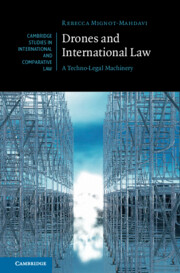Book contents
- Drones and International Law
- Cambridge Studies in International and Comparative Law: 180
- Drones and International Law
- Copyright page
- Dedication
- Contents
- Foreword
- Acknowledgments
- 1 Drone Programs Reconfiguring War, Law, and Societies around Threat Anticipation
- 2 Contexts
- 3 The Institutionalization of Drone Programs
- 4 Targeting Hostile Individuals
- 5 Endless Wars
- 6 Anywhere Wars
- 7 Rituals of Sovereignty
- Epilogue
- Bibliography
- Index
- Cambridge Studies in International and Comparative Law
4 - Targeting Hostile Individuals
Published online by Cambridge University Press: 31 May 2023
- Drones and International Law
- Cambridge Studies in International and Comparative Law: 180
- Drones and International Law
- Copyright page
- Dedication
- Contents
- Foreword
- Acknowledgments
- 1 Drone Programs Reconfiguring War, Law, and Societies around Threat Anticipation
- 2 Contexts
- 3 The Institutionalization of Drone Programs
- 4 Targeting Hostile Individuals
- 5 Endless Wars
- 6 Anywhere Wars
- 7 Rituals of Sovereignty
- Epilogue
- Bibliography
- Index
- Cambridge Studies in International and Comparative Law
Summary
Drone programs in the counterterrorism context rest on the use of force in self-defense not against an (imminent) act, but against individuals in the light of their personal or behavioral characteristics. Because drone programs are motivated by the objective of permanently addressing future threats before they materialize, technology and legal rhetoric are used as instruments to authorize action against individuals who are not presently perpetrating terrorist acts, nor even clearly preparing, such acts. Some states active in the transnational war on terror have proposed a legal framework for the continuous anticipation of armed attacks against individuals who show signs of hostile intent. These changes in military strategy and legal discourse are not merely the result of how states decide to use force in the counterterrorism context, but also of what technology allows them to do. As such, drones facilitate and arguably intensify the phenomena of the individualization and dematerialization of the use of force. Although the interpretation of self-defense proposed by some states active in the war on terror is still highly contested on some points, the chapter shows that even if some limitations remain, concessions to the extensive interpretation of some limitations appear to have a direct cascade effect on the remaining checks because these limitations are interconnected.
Keywords
- Type
- Chapter
- Information
- Drones and International LawA Techno-Legal Machinery, pp. 87 - 118Publisher: Cambridge University PressPrint publication year: 2023



